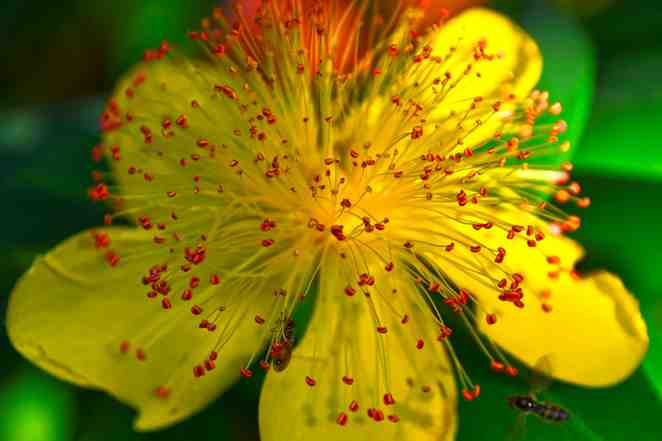
St. John’s Wort
Nature's Prozac
The herb Hypericum performatum (St. John’s Wort) has been effectively used to alleviate the symptoms of mild to moderate depression (not recommended for severe or manic depression), anxiety, and sleep disturbances dating back to ancient Greece.
Physicians Diosocrides, Pliny and Hipprocrates all used hypericum to treat many ailments. "Over an apparition" is the literal Latin translation of the name Hypericum performatum because it was believed to dispel evil spirits and cause them to depart the soul.
St. John’s Wort (as modern herbalists call it) is an extract derived from a yellow flowering perennial plant which grows freely in the wild and is successfully cultivated in many countries.
The term "Wort" (not wart) is an old English term for plant. Naming it after St. John is a long and possibly mythical story. It also carries the names Klamamath weed, goat weed, amber, and Tipton weed in some circles.
Recent reports from Germany call it the fastest rising star in herbal medicine. German physicians in 1994 prescribed over 66 million doses to over 22 million people. This exceeded Prozac prescriptions by 8 fold.
A search of the authoritative data base Medline shows over 1750 research papers published in scientific journals since 1963 with St. John’s Wort as the main subject of investigation. Many of these publications concede that it is in wide use, seems to work as well as common drugs for mild to moderate depression and has relatively few negative side effects.
The caveat on the last statement is - most studies are short term, 4 - 16 weeks, and long term safety has not been scientifically evaluated, in spite of it's long history.
There is also a proliferation of studies attempting to explain why it works, (discussion far beyond this article). Suffice it to say that the evidence seems to point to an enhancement of available serotonin, dopamine and norepinephrine (the "feel good" neurotransmitters) to nerve cells.
Standardized extract has been set at 0.3% Hypercin (different from Hyperforin), one of the many biologically active compounds identified in Hypericum, which may be responsible for its action as an antidepressant.
There are apparently 7 classes of active compounds which may account for the proliferation of uses credited to this herb.
A 1999 study reported in the journal "Alcohol Alcohol" showed St. John’s Wort to have the potential to reduce alcohol craving which would be good news for therapists treating alcoholism.
Another 1999 study reported in Lancet - implicates the Hyperforin compound in the herb as an effective anti-bacterial agent as it inhibited the growth of several strains of Staphylococcus bacteria.
Many other reports suggest it is useful in the treatment of: insomnia, bedwetting, headaches, anemia, shingles and other immune deficiency diseases, infections, inflammatory conditions, sciatica and skin irritations
I should mention that it is reported to be useful in the reduction of symptoms of depression and the foregoing list.
A St. John’s Wort deficiency is not the cause of these ailments. Like any herb, it is "Nature's Medicine", one still needs to address the cause of any ailment.
Consistent recommended dosage throughout the literature is 1 tablet of 300 mg taken 3 times per day for a total of 900 mg of Hypericum performatum, standardized to contain 0.3% Hypercin.
A major negative side effect in a small number of people with sun sensitive skin is the development of "photodermatitis (skin burns or blisters when exposed to sun). This can be avoided by not exposing the skin, but should still be used under the supervision of a licensed health care professional.
Another rider is that it should likely not be taken in conjunction with other antidepressant prescription without the advice of your health care professional.
The consensus in the medical literature is best summarized as "it seems to have a high rate of success in the reduction of symptoms in mild to moderate depression and there are few negative side effects in a very few people.
Consequently it has earned the nick names of "the sunshine herb" or "nature's Prozac".
Previous in Nutrition: Soy Cooking
Next in Nutrition: Story on Fat